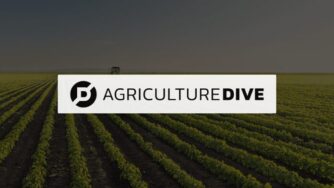At Iowa State, Alejandro Plastina, an associate professor in economics and Extension economist, compared 11 private voluntary programs, across 26 characteristics, in a new report, “How to Grow and Sell Carbon Credits in US Agriculture.” This report compares the requirements to grow and sell carbon and environmental services credits across eleven private voluntary agricultural programs in the United States.
Here is an excerpt from the report:
Why agriculture credits?
A growing number of private initiatives are offering farmers compensation for the generation of agriculture carbon credits as well as other ecosystem services such as improvements in water quality. Credits and ecosystem services are expected to be purchased by large corporations and other entities pursuing a reduction in their environmental footprints. Some large corporations are already purchasing carbon credits generated outside agriculture to comply with environmental regulations and to improve their appeal to environmentally-conscious stakeholders.
According to a 2019 report by the National Academy of Sciences, agricultural practices to enhance soil carbon storage can sequester 250 million tons of carbon dioxide annually in the US, equivalent to around 4% of the country’s emissions. An economic assessment conducted by IHS Markit in 2018 concludes that the potential demand for agriculture carbon credits in the US is 190 million tons per year, falling short from the supply potential of 326 million tons per year. That report estimated the size of the US market for carbon credits at $5.2 billion, and the market for other ecosystem services related to nitrogen and phosphorous management at $8.7 billion annually. In an attempt to jumpstart the incipient voluntary agriculture credits market, a few large companies have announced their compromises to purchase credits in the near future: Microsoft announced an agreement with Truterra, while IBM, JP Morgan Chase, Boston Consulting Group, Dogfish Head Craft Brewing, Shopify, Anheuser-Busch, and Barclays announced agreements with Indigo Ag. However, little is known about the exact details of those transactions. On the supply side, Peoples Company announced the enrollment of 20,000 managed acres with CIBO Impact in January 2021.
The complexities involved in the comparison of agriculture carbon initiatives might discourage agricultural producers from properly evaluating relevant alternatives, resulting in a protracted adoption process, and even an accelerated disadoption process if initiatives fail to satisfy producers’ expectations. The Growing Climate Solutions Act of 2021, which cleared the Senate on June 24, 2021 by a vote of 92-8, supports the development of a voluntary market for agriculture credits derived from the prevention, reduction, or mitigation of greenhouse gas emissions (GHG) or carbon sequestration on agricultural land. The Act creates a voluntary certification program managed by the United States Department of Agriculture (USDA) to help solve technical entry barriers that might prevent farmer participation in private initiatives. In particular, the Act provides the Secretary of Agriculture with an advisory council tasked with ensuring that the USDA certification program remains relevant, credible, and responsive to the needs of farmers and carbon and ecosystem services market participants alike. The advisory council will be composed of a majority of farmers and forest landowners in addition to other agriculture experts, scientists, producers, and others. In an attempt to help farmers navigate the complexities associated with carbon and ecosystem services programs, the present report compares 11 private voluntary programs across 26 variables. The programs include two carbon and ecosystem services credit entities (Ecosystem Services Market Consortium-ESMC and Soil and Water Outcomes Fund), two carbon credit entities (Indigo and Nori), four input suppliers (Agoro Carbon Alliance, Bayer, Corteva, and Nutrien), and three data platforms (CIBO Impact, Gradable, and TruCarbon).



